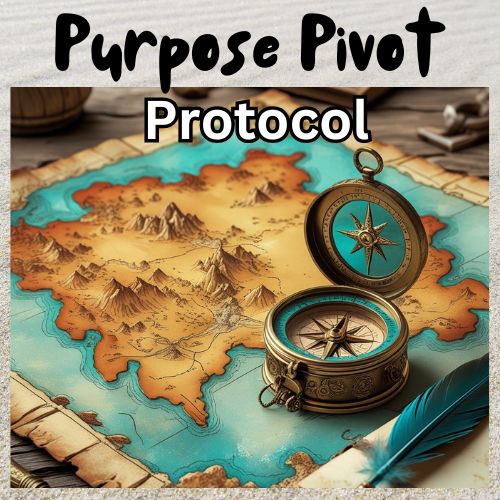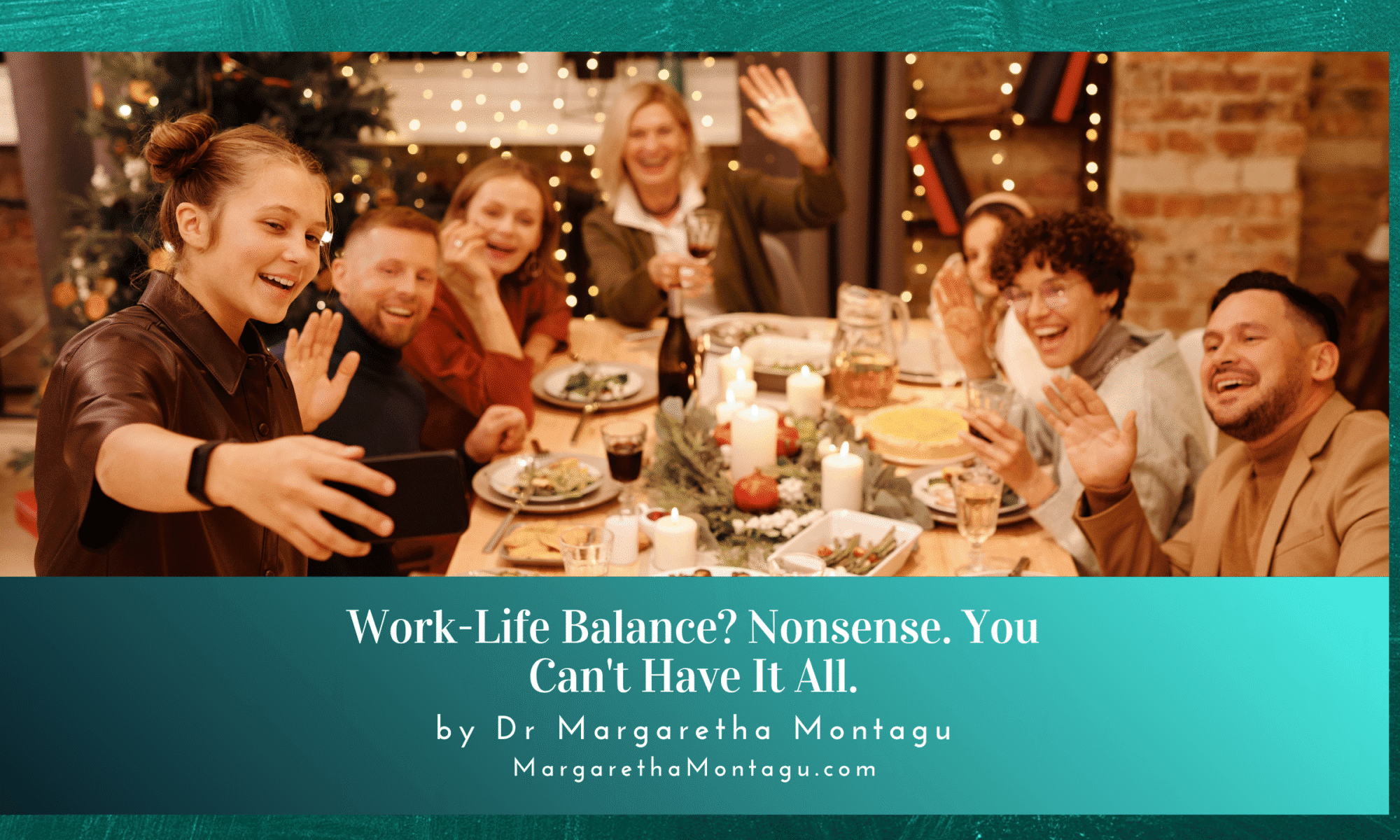Article inspired by Alain de Botton’s TED Talk
I watch a lot of TED Talks, as you may have gathered. Sometimes the same one, again and again. I first watched this in 2009, it’s still as topical now as it was then, if not more. Alain de Botton explains how embracing the beautiful messiness of “imperfect variety” can liberate you from guilt, release you from impossible expectations, and open the door to a more authentic next chapter.
What this is: A permission slip to stop apologising for your choices. A frank, research-backed exploration of why the pursuit of “having it all” is not only exhausting but fundamentally impossible, and how understanding this truth can transform your relationship with success.
What this isn’t: Another productivity hack promising you can squeeze more into your already overcrowded schedule. A self-help sermon about manifesting abundance. Or a suggestion that you give up on what matters.
Read this if: You’ve ever felt like a failure for not being simultaneously the perfect professional, partner, parent, friend, and person. If you’re standing at a crossroads, wondering what comes next, and tired of the exhausting mental gymnastics required to convince yourself you can “balance it all”.
Five Key Takeaways
- Everything worth fighting for unbalances your life, and accepting this is liberating, not limiting.
- Your version of success has likely been borrowed from parents, colleagues, media, and culture, not authentically chosen by you.
- Meritocracy is a myth, success contains enormous elements of chance and luck, and recognising this brings compassion for yourself and others.
- Envy is the dominant emotion of our age, fuelled by the illusion that anyone can achieve anything if they just try hard enough.
- Opting for “imperfect variety over flawless focus” is not a compromise; it’s a choice that reflects the full spectrum of being human.
The Sunday Night Scaries
Philosopher Alain de Botton admits that his career crises typically arrive on Sunday evenings, just as the sun begins to set, when the gap between his hopes for himself and the reality of his life diverges so painfully that he ends up “weeping into a pillow”. It’s a startlingly honest confession from someone who has built a career examining the nature of success, and it perfectly captures what so many high-achieving professionals experience but rarely voice aloud.
The myth of work-life balance has become the ultimate modern guilt trip, a shiny promise that if we just organise better, optimise smarter, or manifest harder, we can have it all without sacrifice. But here’s the uncomfortable truth that de Botton articulates so beautifully: “We hear a lot of talk about work-life balance. Nonsense. You can’t have it all.” And recognising this, rather than being depressing, might be the most liberating realisation of your life.
For executives, entrepreneurs, and professionals who’ve spent decades climbing ladders and meeting targets, this message lands differently than it might for those just starting out. You’ve already experienced the trade-offs, even if you haven’t named them. You’ve missed bedtimes for board meetings, sacrificed friendships for promotions, and chosen ambition over ease more times than you can count. The question isn’t whether you’ll make sacrifices in your next chapter, but whether you’ll make them consciously, for goals that are authentically yours.
Can You Really Choose Your Own Definition of Success?
The answer, according to de Botton, is both yes and profoundly difficult. We are, he argues, “highly open to suggestion”. If banking is presented as respectable, hordes of bright graduates rush toward finance. When the cultural narrative shifts, so do our desires. The forces shaping what we want, from advertising to parental expectations to social media, are “hugely powerful”.
Psychoanalysis has been insisting for 80 years that our ideas of success are largely inherited, chiefly from our fathers if we’re men, and mothers if we’re women. Yet we resist this insight with remarkable tenacity. We prefer to believe our ambitions are self-generated, that we’re captaining our own ships. But are we truly the authors of our own ambitions, or are we performing scripts written by others?
I’ve witnessed this dynamic play out countless times over 20 years of medical practice focused on stress management, and 15 years hosting transformational retreats where participants walk the Camino de Santiago. My guests often have success stories that look enviable from the outside, yet feel hollow on the inside. Through mindfulness exercises, storytelling circles with my Friesian horses, and the gentle rhythm of walking, they begin to distinguish between borrowed dreams and authentic aspirations.
Why Does Modern Success Feel So Insubstantial?
De Botton identifies several interconnected reasons why contemporary life generates unprecedented levels of career anxiety, even for (or perhaps especially for) those who appear successful.
First, there’s the snobbery epidemic. We live in an era of “job snobbery” where people make swift judgments about your worth based on your business card. St. Augustine warned that “it’s a sin to judge any man by his post,” but modern society has done precisely that, creating strict correlations between professional status and human value. When you see someone driving a Ferrari, de Botton suggests, don’t think “this person is greedy”—think “this person is incredibly vulnerable and in need of love”. We pursue material goods not because we’re materialistic, but because society has “pegged certain emotional rewards to the acquisition of material goods”.
Second, there’s the toxic combination of equality and envy. We’ve dismantled formal hierarchies and declared everyone equal, which is beautiful in theory. But in practice, it’s turned “the whole world into a school,” where we’re constantly comparing ourselves to our peers. The closer two people are in age, background, and circumstance, the more dangerous the envy becomes. (This is why, de Botton wryly notes, you should never attend a school reunion).
Third, there’s the meritocracy trap. The idea that talent plus effort equals success sounds progressive. But if you believe success is purely earned, you must also believe failure is deserved. In medieval England, a poor person was called “unfortunate,” someone not blessed by fortune. Today, particularly in America, they’re labelled a “loser”—implying personal responsibility for their circumstances. This shift represents “400 years of evolution in society and our belief in who is responsible for our lives”. It’s “exhilarating if you’re doing well, and very crushing if you’re not”.
This framework helps explain why high achievers often experience disproportionate anxiety. They’ve internalised the meritocratic mythology completely. Every success reinforces the belief that they’re in control, which makes any setback feel like personal failure. The sociologist Émile Durkheim connected this dynamic to increased suicide rates in developed, individualistic countries. People take what happens to them “extremely personally—they own their success, but they also own their failure”.
What Does This Mean for Your Next Chapter?
If you’re contemplating a transition, whether it’s a career pivot, retirement, a relationship or a lifestyle change, or responding to a sudden loss, de Botton’s philosophy offers unexpected comfort. Understanding that perfect balance is impossible, and that all meaningful pursuits create imbalance, removes a significant layer of guilt and expectation.
Your next chapter doesn’t need to be “balanced”—it needs to be intentional. As de Botton articulates, “any vision of success has to admit what it’s losing out on, where the element of loss is”. The question isn’t “can I have it all?” but rather “what am I choosing, and what am I consciously releasing?”
This reframing transforms transitions from failures (failing to maintain previous achievements) into opportunities for conscious selection. Perhaps you’re choosing deeper relationships over professional accolades. Maybe you’re trading income for impact, or status for creativity, or recognition for peace. These aren’t compromises; they’re wise choices reflecting your actual values rather than borrowed ones.
The Story of Caroline Ashworth-Kent
Caroline Ashworth-Kent had perfected the art of appearing effortlessly successful. At 52, she was a partner at a prestigious consulting firm, maintained a meticulously renovated Georgian townhouse in Bath, served on two charity boards, and somehow still found time to host dinner parties that her friends described, with equal parts admiration and envy, as “magazine-worthy.”
What nobody saw were the Sunday evenings. That particular flavour of dread that began around four o’clock, creeping through her chest like cold water as she mentally catalogued the week ahead: client presentations, team performance reviews, the gala she’d committed to organising, her mother’s care needs, the bathroom renovation that had stalled. The list scrolled endlessly.
One Sunday in March, something shifted. She was standing in her kitchen—Carrara marble countertops gleaming under pendant lights—assembling a charcuterie board for guests arriving within the hour. The prosciutto felt slippery between her fingers. She could hear her husband upstairs, searching for something in increasingly irritated tones. Her phone buzzed with a message from a colleague needing input on a proposal. The wine glasses needed polishing. And suddenly, Caroline found herself crying, silently at first, then with gulping sobs that made her shoulders shake.
Her husband found her that way, surrounded by expensive meats and imported cheeses, mascara tracking down her face. “I can’t do this anymore,” she said, though she wasn’t entirely sure what “this” encompassed.
The unravelling took months. First came the admission that she didn’t actually enjoy most of her life—she’d simply become exceptionally skilled at it. The consulting work that had once energised her now felt repetitive, a series of slides rearranging deck chairs on similar corporate ships. The dinner parties weren’t about connection; they were performances of a version of Caroline she no longer recognised. Even the house, with its perfect proportions and tasteful renovations, felt like a museum she was curating rather than a home she inhabited.
But the hardest realisation was this: she couldn’t even clearly articulate what she’d prefer instead. Her desires had become so entangled with expectations—from her father (a successful barrister who’d taught her that ambition was the highest virtue), from her professional peer group (where worth was measured in billable hours and corner offices), from some internalised perfectionist who insisted excellence was possible in all domains simultaneously—that Caroline had no idea which ambitions were actually hers.
She began by doing something small and strange: taking solo walks. Not power walks with a fitness tracker and podcast, but slow, meandering routes through countryside near Bath with no destination or purpose. She’d leave her phone in the car, feeling the spring air against her face, noticing the particular green of new leaves, the muddy smell of the riverbank. These walks felt utterly unproductive, which was precisely why they mattered.
During one of these rambles, Caroline encountered a woman walking with an elderly border collie. They fell into conversation, and the woman mentioned she had recently attended a walking retreat on the Camino de Santiago. “It’s not religious,” she clarified, “more about creating space to hear yourself think.” Caroline surprised herself by asking for details.
Three months later, Caroline found herself in the south-west of France, part of a small group walking 10 kilometres per day. Her feet hurt. Her carefully managed appearance gave way to sunburned cheeks and unwashed hair tied in a pragmatic knot. They walked in silence, then gathered each evening for simple meals and storytelling circles, sometimes with the retreat leader’s horses present—their calm, attentive presence somehow making it easier to speak difficult truths.
It was on the fourth day, sitting with her feet in a cold stream, that Caroline had the realisation: she didn’t need to have it all. In fact, having it all had nearly destroyed her. What she needed was to choose consciously, to release some things with gratitude rather than guilt, and to invest deeply in what actually nourished her.
She didn’t quit her job immediately or abandon her life. But she did begin the careful work of disentangling her authentic desires from her inherited scripts. She reduced her hours at the firm and used the freed time not to fill her schedule with new commitments but to create space. She joined a writing group focused on personal essays. She became a volunteer mentor for women leaving corporate careers. She and her husband began planning a year-long slow travel sabbatical.
Some friends didn’t understand. A few colleagues viewed her choices as a “waste of potential.” But Caroline discovered something unexpected: the less she tried to excel at everything, the more present she became in what she chose to pursue. Her life became gloriously unbalanced, weighted heavily toward meaning rather than achievement, connection rather than status, curiosity rather than certainty.
How Can This Transform Not Just You, But Your Community?
When one person steps off the treadmill of enforced balance and begins living from authentic choice, it creates ripples. Your willingness to be honest about trade-offs gives others permission to do the same. Your example of conscious imbalance challenges the mythology that perpetuates collective exhaustion.
Communities of stressed professionals benefit enormously when individuals begin modelling a different path. In my work hosting storytelling circles at Inner Camino retreats, I’ve observed how one person’s vulnerability about their struggles often unlocks honest conversations throughout the group. When an executive admits they’re not coping, when an entrepreneur acknowledges they’ve lost sight of why they started, when a high achiever confesses to feeling hollow despite external success, it creates what I call “permission fields”—spaces where others can finally be honest too.
This has practical implications for workplaces, families, and social networks. When you stop perpetuating the myth that you’re effortlessly balancing everything, you make it easier for colleagues to advocate for sustainable workloads, for friends to admit they’re struggling, for family members to opt out of expectations that don’t serve them. Your transition becomes not just personal transformation but a form of quiet leadership.
Moreover, the wisdom gained from consciously choosing imbalance over exhausted balance becomes transferable knowledge. You develop insights about authentic prioritisation, graceful release, and conscious trade-offs that can be shared with others navigating similar crossroads. My eight non-fiction books on divorce, loss, unexpected illness, and coping with crises have emerged from exactly this process of transforming personal struggle into communal wisdom.
Excavating Your Borrowed Dreams
Take 20 minutes to write freely, without editing, on these questions:
What ambitions am I currently pursuing that might not actually be mine? Where did they originate? (Specific people, cultural messages, professional norms?) If I’m brutally honest, which goals am I chasing because I believe I “should” rather than because they genuinely matter to me?
What would I release if I weren’t afraid of disappointing someone? Name specific expectations, commitments, or identities. What does it feel like in your body to imagine releasing them?
If nobody else’s opinion mattered, what would my next chapter look like? Not a fantasy version with unlimited resources, but a realistic life weighted differently than your current one. What would you emphasise? What would you de-emphasise or eliminate entirely?
Don’t censor yourself. Nobody else will read this unless you choose to share it. The goal isn’t to immediately act on everything you uncover, but to begin distinguishing between borrowed and authentic desires.
Gratitude for What Got You Here:
Write down five things you’re genuinely grateful for about your current or previous chapter, even if you’re ready to move beyond it. Perhaps the skills you developed, the relationships you formed, the financial security you created, the discipline you cultivated, or even the clarity about what you don’t want.
Intentions for What Comes Next:
Now identify three specific qualities or experiences you want to characterise your next chapter. Not outcomes (which often aren’t fully in our control) but the texture of how you want to live. Examples might include: spaciousness over busyness, depth over breadth, authenticity over approval, presence over productivity, or curiosity over certainty.
Write these intentions somewhere visible. Return to them when facing decisions or feeling pulled back into old patterns.
Further Reading
1. “The Happiness Industry: How the Government and Big Business Sold Us Well-Being” by William Davies
Davies provides a critical examination of how concepts like work-life balance have been co-opted by corporate culture, revealing why these promised solutions often increase rather than decrease our stress. Essential reading for understanding the systems that shape our expectations.
2. “The Art of Choosing” by Sheena Iyengar
Iyengar’s research on choice illuminates how we make decisions and how cultural context shapes what we perceive as desirable. Particularly valuable for executives used to making strategic decisions for organisations who struggle with personal choices.
3. “Tragedy and Hope: A Philosophy of Necessity” by Arthur Versluis
This explores the concept of tragedy not as purely negative but as a necessary dimension of ambitious lives. Directly relevant to de Botton’s discussion of why we need tragic art to balance our relentless optimism.
4. “Seasons of Your Life: How Understanding Cyclical Change Can Enhance Your Life” by Vivienne Weil
Weil’s framework helps readers recognise that different life seasons require different priorities. Perfect for those transitioning between chapters who need permission to let previous versions of success go.
5. “The Ruthless Elimination of Hurry” by John Mark Comer
Comer articulates why speed and productivity have become toxic cultural values, offering practical wisdom on creating a more sustainable pace. Though grounded in Christian spirituality, the insights are applicable regardless of religious affiliation.
My book “Embracing Change, in 10 minutes a day“ offers practical daily exercises specifically designed for busy professionals navigating life transitions, combining evidence-based practices with compassionate guidance drawn from two decades of clinical experience.
Voices
“I arrived at Dr. Montagu’s Camino retreat absolutely convinced I was failing at life because I couldn’t ‘have it all.’ I was a COO trying to be a present mother, an engaged partner, a dutiful daughter, a supportive friend, and maintain my physical health and spiritual practice. I was exhausted and increasingly resentful. Through the walking meditations, the storytelling circles with those extraordinary horses, and the gentle conversations with Dr. Montagu and other guests, I finally understood that balance was never the goal. The goal was choosing consciously. I left the retreat with fewer commitments but clearer purpose. The peace I’ve found since embracing intentional imbalance has transformed not just my life, but my relationships with everyone around me. This wasn’t a vacation; it was a recalibration.”
— Katherine R., Amsterdam
“Being part of Dr. Montagu’s virtual Inner Camino storytelling circle gave me something I didn’t even know I needed: permission to be imperfect and honest. Hearing other high-achieving women acknowledge their struggles with impossible expectations helped me recognise I wasn’t uniquely failing. The structured format and Dr. Montagu’s skilled facilitation created a rare space where vulnerability felt safe. These circles have become essential maintenance for my mental health, a monthly reminder that my worth isn’t measured by my productivity or ability to juggle everything flawlessly. The insights and connections have been invaluable as I navigate a major career transition.”
— Simone L., London
Frequently Asked Questions
Isn’t giving up on work-life balance just accepting burnout as inevitable?
Not at all. Recognising that you can’t excel at everything simultaneously isn’t the same as accepting destructive overwork in one domain. It’s about conscious choice rather than exhausted striving. Burnout typically results from feeling trapped, from pouring energy into meaningless work, or from constantly falling short of impossible standards. Choosing intentional imbalance means directing your finite resources toward what genuinely matters to you, which is actually protective against burnout
How do I know which version of success is authentically mine versus borrowed?
De Botton’s guidance is to “probe away at our notions of success”. Practical questions include: Does pursuing this goal energise or deplete me? Am I doing this to gain someone else’s approval or because it resonates with my actual values? Would I pursue this if nobody else would ever know about it? Can I identify whose voice is in my head when I imagine achieving this? Working with a life transition coach trained in evidence-based approaches, as offered through Inner Camino’s Purpose Pivot Protocol, can provide structured support for this excavation process.
What about financial realities? I can’t just quit my high-stress job to “find myself.”
Absolutely valid. De Botton isn’t advocating irresponsibility. The philosophy is about honest recognition of trade-offs within real constraints, not fantasy thinking. You might, for instance, choose to remain in a demanding role while releasing the expectation of simultaneously being available for every family event, or excel professionally while letting go of guilt about a less-than-perfect home. The shift is internal as much as external, moving from “I should be able to do everything” to “I’m choosing this, which means not choosing that”.
Won’t embracing imbalance make me less successful professionally?
Research suggests the opposite. High achievers who stop fragmenting their energy across impossible standards and instead focus deeply on selected priorities often become more effective, not less. Moreover, success redefined on your own terms might look different than conventional markers, but it’s likely to be more sustainable and satisfying. De Botton notes that “focusing on one thing to the exclusion of all others has its costs,” but so does diffusing yourself so thinly that nothing gets your best energy.
How do I handle judgment from others when I make unconventional choices about balance?
De Botton’s suggestion about the Ferrari driver applies here: when someone judges your choices, recognise they’re likely projecting their own anxieties and insecurities. People who’ve built their identities around “having it all” may feel threatened by your different approach. Your job isn’t to justify yourself to them, but to ensure your choices genuinely reflect your values. Over time, living with greater authenticity and less exhaustion becomes its own validation. And often, your willingness to choose differently gives others quiet permission to examine their own assumptions.
Conclusion: An Unbalanced Life, Well-Lived
Alain de Botton’s declaration that work-life balance is “nonsense” isn’t pessimistic—it’s liberating. When you stop pursuing an impossible ideal and start making conscious choices about where to direct your limited time, energy, and attention, you trade chronic guilt for grounded intentionality.
Your next chapter doesn’t need to prove you can have it all. It needs to reflect who you actually are and what you genuinely value, not what you’ve been told to want. As you contemplate transitions, whether by choice or circumstance, remember that “opting for imperfect variety over flawless focus” isn’t compromise—it’s wisdom.
The executives, entrepreneurs, and professionals I’ve worked with over 15 years of Camino de Santiago retreats consistently discover that their most profound transformation comes not from adding more to their lives, but from consciously releasing what doesn’t serve them, making space for what does. This process requires courage, honesty, and often support from others navigating similar terrain.
As the writer Annie Dillard reminds us: “How we spend our days is, of course, how we spend our lives.” Not how we wish we spent them, not how we think we should spend them, but how we actually, consciously choose to spend them. The question isn’t whether your life will be balanced, but whether it will be yours.
An Invitation to Walk Your Own Path
If this article resonated with something stirring in you, if you’re standing at a crossroads wondering what your next chapter might hold, if you’re exhausted from maintaining impossible standards and ready to explore a different way forward, I invite you to consider joining us for anCamino de Santiago Crossroads Retreat in the stunning south-west of France.









These aren’t typical walking holidays, nor are they rigid wellness programmes with impossible schedules. They’re carefully designed spaces where accomplished professionals like you can step away from performance, reconnect with what matters, and begin discerning your authentic path forward. Over five or seven days, you’ll walk 12-15 kilometres daily through beautiful countryside, participate in guided mindfulness and meditation exercises specifically tailored for stress management, and join intimate storytelling circles where my Friesian horses create a calm, non-judgemental presence that often helps people access deeper truths.
Drawing on my qualifications as an MBChB, MRCGP, NLP master practitioner, medical hypnotherapist, and life transition coach, along with 20 years of clinical experience supporting patients through stress and transitions, these retreats blend evidence-based practices with the transformative power of walking meditation. The 30+ testimonials on my website speak to the profound shifts guests experience, not through pressure or prescription, but through the gentler path of spaciousness, honest reflection, and supportive community.
Whether you’re contemplating a career pivot, recovering from loss or unexpected change, or simply sensing that your current chapter is complete even though the next one hasn’t yet revealed itself, this retreat offers the rare gift of time and space to listen to yourself. You’ll leave not with answers imposed from outside, but with greater clarity about your own questions and more confidence in your capacity to navigate whatever comes next.
Learn more and reserve your room
For those not ready for an in-person retreat, my Purpose Pivot Protocol online course offers structured guidance through life transitions, helping you distinguish between borrowed and authentic goals, release what no longer serves you, and step confidently into your next chapter from wherever you are.

The Purpose Pivot Protocol – drawing inspiration from the Camino de Santiago, this transformative course guides you through a proven framework to recalibrate your authentic purpose and create a meaningful and fulfilling next act. Get immediate access
Stress destroys Lives. To find out what you can do to safeguard your sanity by taking my insight-giving quiz, subscribe to my mailing list.

Author Bio: Dr Margaretha Montagu – described as a “game changer”, “gifted healer”, “guiding light” and “life-enriching author” – is an experienced medical doctor, a certified NLP practitioner, a medical hypnotherapist, an equine-assisted psychotherapist (EAGALAcertified) and a transformational retreat leader who guides her clients through life transitions – virtually, or with the assistance of her Friesian and Falabella horses, at their home in the southwest of France.

